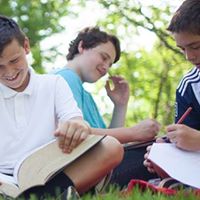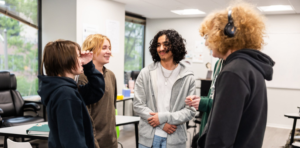Is The Sycamore School a Montessori School?
Parents and other professionals often ask if The Sycamore School is a Montessori School. The short answer is no. The more complete answer is that TSS shares many commonalities with Montessori programs and would be a good fit for students with a Montessori background, as we strive to cultivate many of the same attributes of Montessori programs: curiosity, creativity, initiative, independence, intrinsic motivation, respect, and love of learning.
What is Montessori?
 According to the American Montessori Association, “The Montessori Method of education, developed by Dr. Maria Montessori, is a child-centered educational approach based on scientific observations of children from birth to adulthood. Dr. Montessori’s Method has been time tested, with over 100 years of success in diverse cultures throughout the world.”
According to the American Montessori Association, “The Montessori Method of education, developed by Dr. Maria Montessori, is a child-centered educational approach based on scientific observations of children from birth to adulthood. Dr. Montessori’s Method has been time tested, with over 100 years of success in diverse cultures throughout the world.”
Ways that TSS is similar to a Montessori School
1. Students & teachers are partners in learning – Teachers serve as a guide and facilitator, helping students seek out new opportunities to explore content; students learn how to initiate tasks, work through challenges and take ownership of their learning.
2. Freedom with Responsibility – Students have input into many aspects of the school, including activity choice, course selection and community involvement. However, students are also expected to take ownership of their learning, understanding how they learn best and utilizing their strengths to help navigate challenges.
3. Learning is individualized, student-centered and self-paced – Students work at their own pace, which means there are opportunities for remediation, when needed, and acceleration, when appropriate.
4. Experiential Learning – Students regularly participate in hands-on activities paired with a reflection exercise, so that they can debrief and evaluate what they’ve just experienced.
5. Integrated Curriculum – Students connect concepts across content areas to the real world.
6. Whole Child Approach – We incorporate social & emotional learning into our school day, so that students learn strategies to help them improve their self-awareness, self-regulation and relatedness to others. We help students learn how to effectively collaborate, communicate and problem solve. We teach students about physical development, group dynamics and brain development, so that they understand and embrace the roles of working with others and have appropriate language to use in those roles.
7. Cooperative Learning Opportunities – Students have structured opportunities to work together. In a TSS classroom, you are likely to see some students working independently, some in pairs and some in small groups.
8. Purposeful community service projects – Students participate in community service projects that are meaningful to them and incorporate their skills and interests.
9. Accommodate different types of learners – Students have choices of how material is presented, how they work with the material and how they demonstrate mastery.
10. Movement incorporated throughout the day – The first class of the day is a movement class and students also have a break to go outside and/or move around after lunch. In their classes, students move around the classroom with purpose.
11. Mixed Age/Grade Classes – This serves several purposes. Academically, it facilitates addressing individual learning needs and gives an opportunity for peer mentoring. Socially, mixed grade classrooms can break down the artificial barriers and social hierarchy that often arises when schools have students only in classes with peers their same grade.
12. Outings – We focus on experiential learning and will have, at minimum, weekly outings where students can learn in their community. These activities include field studies, service learning and community building exercise.
Ways that TSS is different from a Montessori School
1. Technology – At TSS, each student has a laptop and utilizes technology to solve problems and access resources. There are also times in the day that are purposefully technology free, such as lunch and recess, so that students can focus on directly engaging with others.
2. Materials – We use a variety of materials to create high interest activities. However, we do not use Montessori materials.
3. Teacher Background – Our teachers are fully licensed and experts in their subject area; they also have experience creating curricula, differentiating instruction and problem-based learning. Our teachers are not trained Montessori teachers.
4. School Structure – Our weekly schedule includes times for core subject learning, electives, project-based learning and community-based activities. We combine elements of both process and content in our instruction.
5. Focus on 21 st Century Learning – We recognize that content knowledge alone does not sufficiently prepare our students for college and the workforce. So, we integrate interdisciplinary themes into the core subjects, such as Financial Literacy, Technology Literacy and Economic Literacy. We also teach students life and career skills such as flexibility, accountability and leadership.
6. Civic Engagement – We have three core roots that are equally weighted and are interwoven. They are Academic Development, Social & Emotional Growth and Civic Engagement. Civic Engagement includes community awareness, civic literacy and global awareness. We want to increase our student’s awareness of the resources in our community and how to access those resources. We also want our students to discover how to become more involved in their community and be knowledgeable about their larger global community.
7. Setting – We embrace an urban school model, where we regularly utilize community resources to create a living classroom. We have 5 parks within walking distance and downtown museums are only a 20-minute metro ride away.
The Sycamore School strives to create an environment where students can thrive. In doing so, we do share many commonalities with Montessori Schools, but we are also unique in our emphasis on Experiential 21st Century Learning in an urban school setting. If you are looking for a secondary school that would complement your child’s primary Montessori education, we invite you to meet us in person and learn more.
Posted in:

